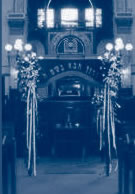|
SEDRA : Vayetze: Hertz Chumash p. 106 Genesis
Chap. 28 verse 10
This week's Sedra is generously sponsored by Don Schauder.
SYNOPSIS
Journeying from Beersheba to Charan, Jacob reached"the
place" (Mount Moriah) and slept there overnight. In a
dreamlike vision, he saw angels ascending and descending a
ladder standing on the earth with its top reaching the heavens.
G-d then appeared and promised Jacob and his descendants the
land he was now resting on and that he would return home under
G-d's protection. Upon awaking, Jacob anointed and consecrated
the stone he had placed under his head as an altar to G-d
vowing that on his safe return to his father's home, he would
offer to G-d one-tenth of all his possessions and would worship
G-d at the altar he had just consecrated.
Jacob arrived at a well on the outskirts of Charan. Three
flocks of sheep and their shepherds had gathered around the
well sitting idly. Jacob inquired and learned they were from
Charan.
They knew Lavan son of Nachor and, coincidentally, pointed
to Rachel his daughter who was arriving with Lavan's sheep.
Surprised that they had gathered so early and were not grazing
their sheep, the shepherds replied to Jacob that all the shepherds
were needed to roll the large stone off the well before they
could water their sheep.
As Rachel drew nearer with her father's sheep and Jacob saw
her, he was so moved as to roll the heavy stone off the well
singlehandedly, and watered Lavan's sheep.
He acquainted Rachel of their familial relationship and she
quickly ran to inform her father of his arrival. Lavan welcomed
Jacob and agreed that he work as Lavan's shepherd for seven
years in order to marry Rachel, whom he had come to love.
After the seven years of waiting, Lavan tricked Jacob by substituting
his elder daughter, Leah, in place of Rachel under the wedding
canopy. He justified this deceit because Leah was older and
therefore should be married first. Jacob had no choice but
to accept the situation. He soon married Rachel as well after
Lavan had extracted a promise of a further seven years' work
from him.
Seeing that Leah perceived that Rachel was favoured, G-d
caused her to have children while Rachel remained barren.
Leah gave birth to Jacob's first four sons: Reuven, Shimon,
Levi and Yehudah. Rachel, realising that she was not having
children, followed Sarah's example offering her handmaiden,
Bilha, to Jacob as a wife. Bilha bore Jacob his next two sons,
Dan and Naftali.
Seeing that she had stopped giving birth, Leah also gave
her handmaiden, Zilpah, to Jacob as a wife. Zilpah bore Jacob
his next two sons, Gad and Asher. Leah herself then had Yissachar
and Zevulun as well as a daughter, Dinah. Finally G-d remembered
Rachel and answered her prayers granting her a son whom she
called Joseph.
With G-d's help, Jacob became very wealthy, but this aroused
the jealously of Lavan and his sons. Consulting with his wives,
Jacob decided it was time to leave. So Jacob took his wives,
children, and flocks with him while Lavan was away, and began
the journey homewards. Rachel, without Jacob's knowledge,
had stolen her father's idols (reasoning this would prevent
him from worshipping them). Three days later Lavan was told
of Jacob's departure, and Lavan pursued him, overtaking him
at the mountains of Gilad. G-d appeared to Lavan in a dream
warning him not to harm Jacob or make him return to Charan.
Lavan upbraided his son-in-law for having left so hurriedly,
and accused him of the theft of his idols. Denying the theft,
Jacob unwittingly declared that whoever who had taken the
idols would die. Lavan's search proved fruitless for Rachel
had hidden the idols. Jacob and Lavan then parted, after completing
a peace treaty, and Jacob and his household headed homewards.
Angels of G-d met Jacob during his travels so he named the
place Machanayim.
HAPHTORAH HERTZ CHUMASH P.118 Hosea Chap 12 Verse 13
The Sedra refers to the achievements of Jacob, chosen custodian
of the Covenant of Abraham, in his years in Aramea as a fugitive
from his brother's hatred. He builds his family who are later
to develop into a nation redeemed from Egypt by a great prophet
and who then dwell in their land achieving greatness. Israel
must learn to appreciate their mission and for what they are
valued by G-d.
TELL ME RABBI ... THE WEEK AFTER THE WEDDING
In Jewish tradition couples do not embark upon their honeymoon
immediately following the wedding. The celebration of their
wedding continues for a full week called Shiva't Y'me Hamishteh
- the Seven days of Feasting. These are said to be ordained
by Moses and are a custom originating from as far back as
Patriarchal times where Jacob's weddings are described.
These celebrations serve as a focal point for Communal rejoicing
and for the couple to begin their married life enveloped by
the warmth, encouragement and attentions of the community.
The Bride and groom do not work during this week, but focus
only on eating, drinking and rejoicing in each other.
Traditionally, each day close relatives or friends host the
couple for a festive meal. It is customary for words of Torah
to be delivered by the groom and/or the guests. The groom
is soon interrupted by singing so as not to shame grooms who
are not capable of scholarly discourse.
The meal concludes with Sheva Brachot. A minyan is required
which should include at least one person who was not present
at the wedding or a previous Sheva Brachot (Panim Chadashot
- `new faces').
"Shabbat Shalom" is generously sponsored by Rosetta
and Nathan Baron
BACK TO SHABBAT SHALOM
TABLE
|








